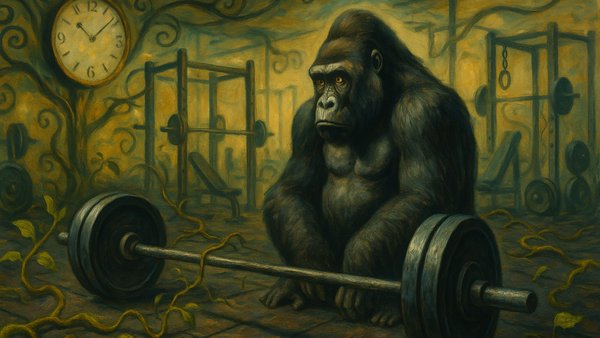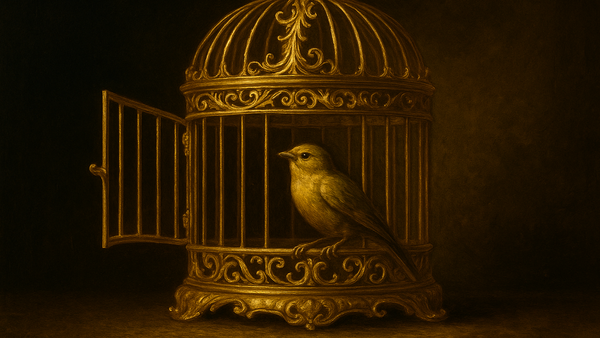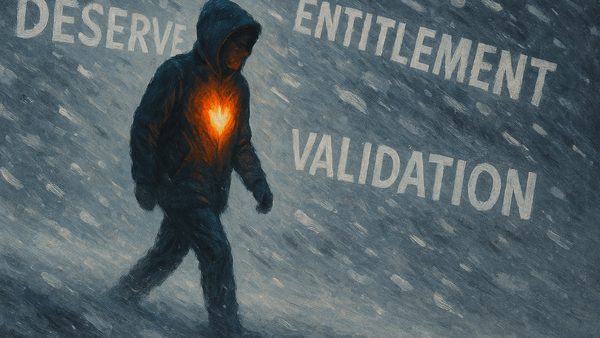Start With What
Discover the one question that built empires—and it’s not “Why?” This issue is about menopause, totalitarianism, and motivation.
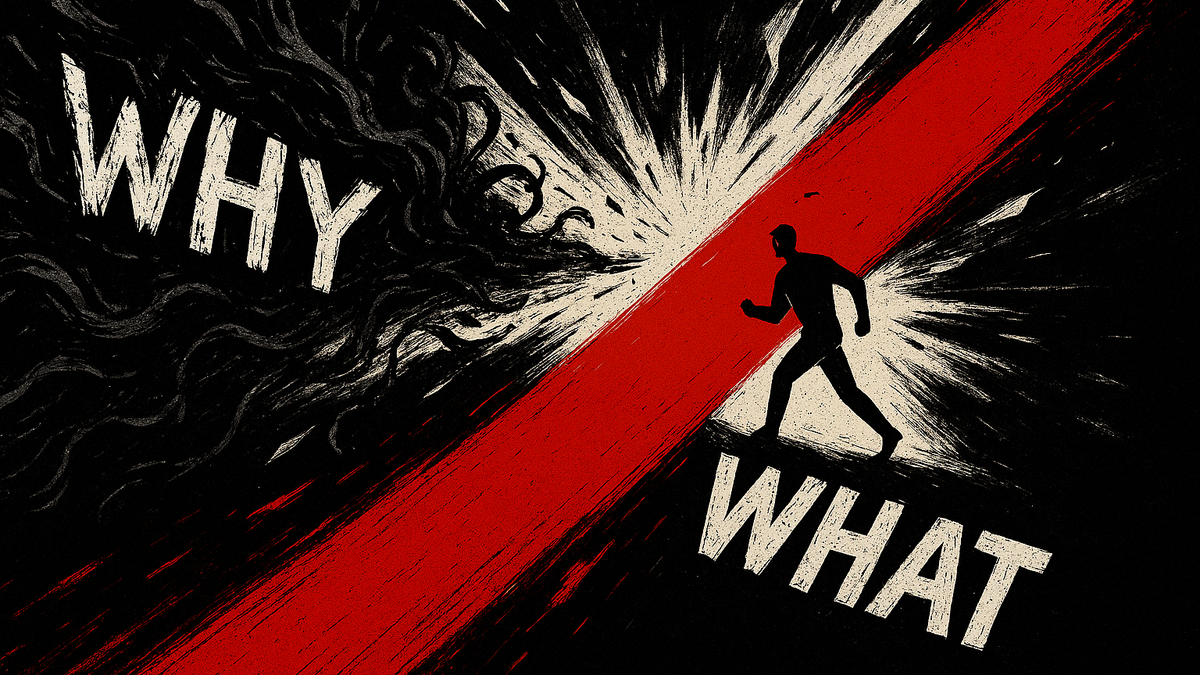
Many people seem obsessed with “Why?” Contrary to that, every great movement, every empire, every legend, began not with endless meditation on Why but with a fierce declaration of What. Action has always been the divine force that shapes the world. Those who hesitate in contemplation, waiting for purpose to strike, are left behind by the march of history.
Let’s sharpen our blade of reason and drive it deep into the muddled ramblings of the average self-help guru.
The Trap of Starting with Why
You may have heard that to Start with Why—to know your deeper reason—is the ultimate driver of action. That success begins with purpose. But interrogate Why long enough and you will inevitably fall into a void—either into nihilism, the conclusion that nothing has meaning, or into blind faith, surrendering your agency to blind faith.
Why seek greatness?
Why strive for wealth, or creation?
Going down the rabbit hole of the Why-question is an intellectual ouroboros—a snake devouring its own tail. It leads nowhere but paralysis.
Yes, Why? matters. But not as a starting point. Understanding why you do something clarifies your motives. But it does not get you moving.
Purpose is not found through endless pondering. It is discovered through action. The layers of Why peel off on their own—by walking the path. From the journey itself, your Why will reveal itself—not before it begins.
And what about the How? Once you’ve nailed down your What, the How will follow as naturally as breath follows a gasp for air.
The Power of What
What do you want?
What will you create?
What will you conquer?
Unlike the Why, the What is tangible. It demands movement. The history of greatness is not filled with men who dwelled endlessly on internal motivations, contemplating purpose, but with those who defined their What—and let their Why be forged in fire along the way. Their What made them legends.
- Julius Caesar: “Veni, vidi, vici.” (I came, I saw, I conquered.)
No endless ruminations on purpose—only ruthless clarity. Caesar marched, he fought, he won. - Alexander the Great: “There is nothing impossible to him who will try.”
He didn’t ask if it was his destiny to conquer the world. He decided it was. - Theodore Roosevelt: “Do what you can, with what you have, where you are.”
In his 1910 New York speech, Roosevelt didn’t advocate philosophizing—only action. He understood that pondering Why is often an excuse. You move forward with what you have, and the purpose will reveal itself. - Elon Musk: “I think it is possible for ordinary people to choose to be extraordinary.”
No mystical search for meaning. Musk chooses to create—and meaning emerges from the work itself. - Marcus Aurelius: “Waste no more time arguing about what a good man should be. Be one.” (Meditations, Book X, 16)
The epitome of action over theory. A true man doesn’t sit idle, debating purpose. He embodies it. - Steve Jobs: “People don’t know what they want until you show it to them.”
No higher preordained purpose. Jobs decided what the object of desire would be. He created it, he shared it, and the world followed. - Napoleon Bonaparte: Circumstances? I make circumstances.”
No waiting. No philosophizing. Just relentless pursuit of his chosen path. - Benjamin Disraeli: “Man is not the creature of circumstances. Circumstances are the creatures of men.”
In his 1851 speech in the House of Commons, he portrayed the mindset of a ruler, a conqueror, a self-made legend. The world does not define you with some intangible Why—you define the world through your chosen What. - Genghis Khan: “If you’re afraid—don’t do it. If you’re doing it—don’t be afraid.”
Khan unified the Mongol tribes and reshaped the world through sheer will—not introspection. - Qin Shi Huang: “A thousand-mile journey begins with a single step.”
The first emperor of a unified China did not hesitate to find his Why. He saw what needed to be done—and he did it. - Jesus Christ: “Not everyone who says to me, ‘Lord, Lord,’ will enter the kingdom of heaven, but only the one who does the will of my Father who is in heaven.” (Matthew 7:21)
No Why—just a strong What. Entering the kingdom of heaven, discovering the ultimate Why, is possible only through action. Belief alone is worthless. Only action grounded in belief yields results. - Moses: “See, I am setting before you today a blessing and a curse—the blessing if you obey the commands of the LORD your God… the curse if you disobey.” (Deuteronomy 11:26–28)
Moses didn’t offer speculation—he offered a choice: act and be blessed, or hesitate and be cursed. He gave the What, so the people wouldn’t get stranded in the Why. Why? Because the Lord said so.
Make no mistake—these men did reflect deeply on their motivations. Many wrestled with their divine Why. But the modern idea that insight precedes motion is a myth.
The first step on any journey is the step itself, not its purpose.
Even those most associated with Why—those who gave us entire philosophies of meaning—did not begin with it. They walked first. Their insights came through the journey, not before it. They acted. They suffered. And only then did they carve meaning from the chaos.
- Friedrich Nietzsche: “He who has a why to live for can bear almost any how.”
Nietzsche did not arrive at this insight in peace. He forged it through years of madness, solitude, illness, and relentless creation. - Viktor Emil Frankl: “Life is never made unbearable by circumstances, but only by lack of meaning and purpose.”
Frankl didn’t discover this insight in a study. He found it in Auschwitz—tending to the dying, moving when others collapsed. His Why came later. Action came first. - Siddhārtha Gautama: “I teach suffering, its origin, cessation, and the path.”
Buddha devised a method—not a metaphysical Why. He didn’t start with abstract meaning. He saw suffering and left his palace to end it. He wandered, starved, experimented. His What was clear: liberation.
The Divinity of Defining Purpose
To shape reality according to one’s will is a god-like act. It is how humanity has always envisioned its gods. Thus, the essence of manhood is to define one’s path—to create frameworks and impose order upon chaos.
Throughout history, free men have always been those who could define their own What. That is what sets them apart from slaves—men compelled to obey frameworks imposed by others.
A man who cannot define his What is, by default, subjected to another’s will. He works for another’s What while endlessly wondering why he even does what he does. And this question brings him nowhere—except, perhaps, into frustration.
True masculinity is not found in endless questioning—but in decisive action. To act is to be free.
Want to write? Then write.
Want to build? Then build.
Want to rule? Then take command.
Start with What.
Focus all your energy on discovering what it is that you want. Everything else is part of the journey. Your search for meaning will not be answered in a dark room with a furrowed brow. It will be answered on the battlefield of life—through trial, error, creation, destruction, and conquest. Purpose is a product of action. It is not something you wait for. It is something you forge.
So—what will you do?
The world does not wait.
And neither should you.
⏤Ferdinand
SUNDAY’S SPARKS
📝 ARTICLE: The Origin of Menopause: Why Do Women Outlive Fertility?
This article explores the evolutionary puzzle of why human females—women—experience menopause and live long after their reproductive years. Several theories exist, such as the ‘grandmother hypothesis,’ which suggests that post-reproductive women enhance their genetic legacy by supporting grandchildren, and the ‘mother hypothesis,’ which proposes that ceasing reproduction allows older women to focus on existing offspring. Current research indicates that intergenerational reproductive conflict may have driven the evolution of menopause, with older women stepping aside to benefit their daughters-in-law’s reproductive success.
The answer is likely a mix of these factors. What we can say with near certainty, however, is that the recent rise of contraception, women’s rights movements, and other family-countering, gender-role ideologies have significantly disrupted these natural dynamics.
Cant and co-author Rufus Johnstone, an evolutionary biologist at the University of Cambridge in England, used game theory to argue that menopause is early cessation of reproduction that originated through reproductive conflict between generations. In most cooperatively breeding species, reproduction is suppressed in younger females, who act as helpers to older reproducing females. By contrast, they say, younger women in human social groups win the reproductive sweepstakes, because the older ones stop having babies.
"We showed that, compared to other primates that exhibit a post-reproductive life span, humans really stand out, because there is absolutely no overlap in reproduction between generations," Cant says. "Women stop breeding on average when the next generation starts to breed."
This makes evolutionary sense, Cant and Johnstone say, because, contrary to most mammals, young women tend to move to their mates' communities, where they become immigrants whose only genetic kin are their own children. There is no genetic profit in helping their mothers-in-law bear more children, because they will not share any genes with those children. But an older woman who helps her son's wife reproduce will benefit by bequeathing 25 percent of her genes to her grandchildren.
Another explanation for menopause is the "mother hypothesis," which holds that it occurs because older mothers might profit more, genetically speaking, by investing resources in their existing children than in giving birth to new ones. Researchers at the Max Planck Institute for Demographic Research in Rostock, Germany, make the case for this in the American Journal of Physical Anthropology (AJPA), concluding that menopause is advantageous when a woman has aged enough to face an increased risk of stillbirth, birth defects and her own death in childbirth.
📚 BOOK: Animal Farm, George Orwell
Allegorical novella that critiques totalitarianism through the story of farm animals who overthrow their human owner, hoping to create an egalitarian society. As power consolidates in the hands of the pigs—especially the cunning Napoleon—the farm devolves into tyranny, mirroring the corruption of revolutionary ideals. Orwell, a British writer and critic of authoritarian regimes, uses simple language and symbolic characters to expose how propaganda, fear, and manipulation erode freedom and justice. A sharp political fable cloaked in rural simplicity.
'Comrades,’ [Squealer] said, 'I trust that every animal here appreciates the sacrifice that Comrade Napoleon has made in taking this extra labour upon himself. Do not imagine, comrades, that leadership is a pleasure! On the contrary, it is a deep and heavy responsibility. No one believes more firmly than Comrade Napoleon that all animals are equal. He would be only too happy to let you make your decisions for yourselves. But sometimes you might make the wrong decisions, comrades, and then where should we be?
[Napoleon] said that the education of the young was more important than anything that could be done for those who were already grown up. It happened that Jessie and Bluebell had both whelped soon after the hay harvest, giving birth between them to nine sturdy puppies. As soon as they were weaned Napoleon took them away from their mothers, saying that he would make himself responsible for their education. He took them up into a loft which could only be reached by a ladder from the harness-room, and there kept them in such seclusion that the rest of the farm soon forgot their existence.
'I do not believe that Snowball was a traitor at the beginning,’ [Boxer] said finally. 'What he has done since is different. But I believe that at the Battle of the Cowshed he was a good comrade.'
'Our Leader, Comrade Napoleon,' announced Squealer, speaking very slowly and firmly, 'has stated categorically—categorically, comrade—that Snowball was Jones's agent from the very beginning—yes, and from long before the Rebellion was ever thought of.'
'Ah, that is different!' said Boxer. 'If Comrade Napoleon says it, it must be right.'
'That is the true spirit, comrade!' cried Squealer, but it was noticed he cast a very ugly look at Boxer with his little twinkling eyes. He turned to go, then paused and added impressively: 'I warn every animal on this farm to keep his eyes very wide open. For we have reason to think that some of Snowball's secret agents are lurking among us at this moment!'
One Sunday morning Squealer announced that the hens, who had just come in to lay again, must surrender their eggs. Napoleon had accepted, through Whymper, a contract for four hundred eggs a week. The price of these would pay for enough grain and meal to keep the farm going till summer came on and conditions were easier.
When the hens heard this they raised a terrible outcry. They had been warned earlier that this sacrifice might be necessary, but had not believed that it would really happen. They were just getting their clutches ready for the spring sitting, and they protested that to take the eggs away now was murder. For the first time since the expulsion of Jones there was something resembling a rebellion. Led by three young Black Minorca pullets, the hens made a determined effort to thwart Napoleon's wishes. Their method was to fly up to the rafters and there lay their eggs, which smashed to pieces on the floor. Napoleon acted swiftly and ruthlessly. He ordered the hens' rations to be stopped, and decreed that any animal giving so much as a grain of corn to a hen should be punished by death. The dogs saw to it that these orders were carried out. For five days the hens held out, then they capitulated and went back to their nesting boxes. Nine hens had died in the meantime.
'My sight is failing,’ [Clover] said finally. 'Even when I was young I could not have read what was written there. But it appears to me that that wall looks different. Are the Seven Commandments the same as they used to be, Benjamin?'
For once Benjamin consented to break hisrule, and he read out to her what was written on the wall. There was nothing there now except a single Commandment. It ran:
ALL ANIMALS ARE EQUAL BUT SOME ANIMALS ARE MORE EQUAL THAN OTHERS.
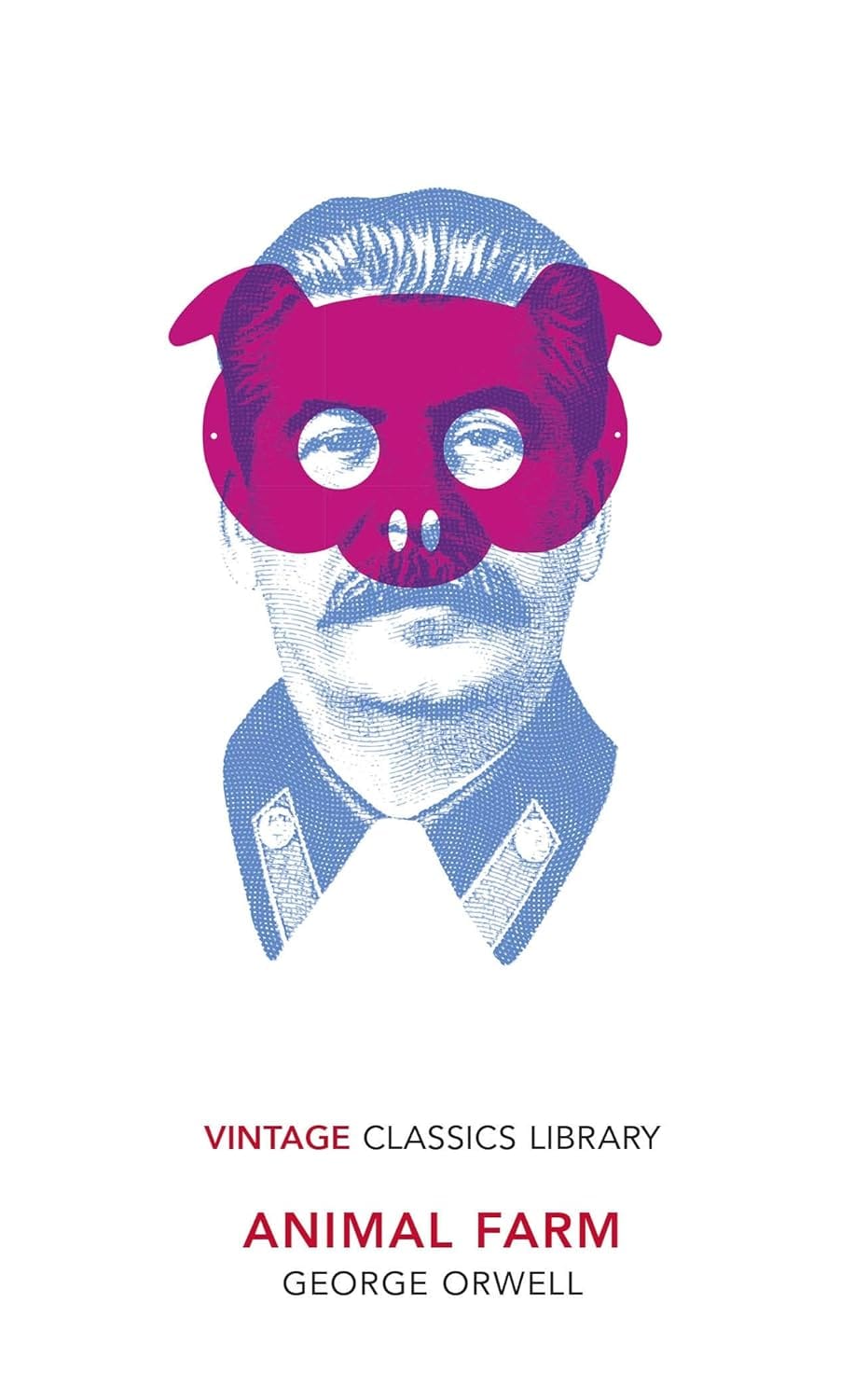
🎵 MUSIC: Imagine Dragons – Believer
An older song, and I just came across it now. Anyway, in case you haven’t heard it either, it’s a real banger. Went straight into my motivation playlist.
SUNDAY’S WISDOM
Remember that self-discipline is not self-suppression. Suppression is when you resist and fight against your desires, keeping them as buried and unexpressed as possible. Self-discipline is when your highest desires rule your lesser desires, not through resistance, but through loving action grounded in understanding and compassion.
From The Way of the Superior Man
by DAVID DEIDA
Captured with the powerful Kindle reader.
Did this issue spark something in you?
Fuel Sunday Sparks’ independence.
Flows straight into content, not coffee.

